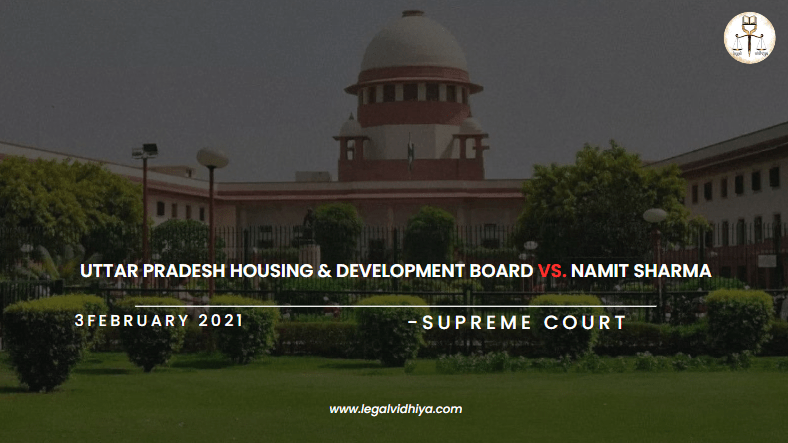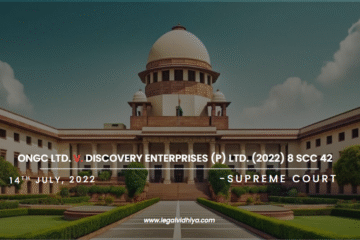
| CITATION | Civil Appeal No. 4020 of 2010 |
| DATE OF JUDGMENT | 3rd February 2021 |
| COURT | Supreme Court of India |
| APPELLANT | U.P. Housing & Development Board & Anr. |
| RESPONDENT | Namit Sharma |
| BENCH | Justice Ashok Bhushan, Justice R. Subhash Reddy |
INTRODUCTION
The case of Uttar Pradesh Housing & Development Board vs. Namit Sharma revolves around a dispute concerning the allocation of a High Income Group (HIG) plot, originally registered by the respondent’s grandfather, Shri M.L. Sharma, under a housing scheme by the Uttar Pradesh Housing & Development Board (U.P. Awas Evam Vikas Parishad). The core issue pertains to the validity of the registration after policy changes and the consequent entitlement of the respondent, Namit Sharma, to the plot.
FACTS OF THE CASE
- On 16.09.1982, Shri M.L. Sharma registered for an HIG plot with the Uttar Pradesh Housing & Development Board.
- On 15.09.1983, M.L. Sharma nominated his grandson, Namit Sharma, thes respondent, as his successor for the plot registration, with Smt. Sudha Sharma (Namit’s mother) as guardian until Namit reached the age of majority.
- M.L. Sharma passed away on 09.06.1984. Following the grandfather’s death, Smt. Sudha Sharma requested a refund of the registration money. However, the Board demanded an additional Rs. 3,000 due to price escalation, which was not deposited.
- A government order dated 11.10.2002, along with subsequent communications, stated that old registrations of unsuccessful applicants would not be renewed, and refunds would be issued instead.
- Namit Sharma repeatedly requested the transfer of the registration to his name and the allotment of a plot, which the Board denied based on the aforementioned government order and the expiration of the old registration.
- He filed a writ petition leading to the Allahabad High Court directing the Board to allot a plot to him within six weeks, a decision which the Board appealed.
ISSUES RAISED
- Whether the respondent had the right to transfer the plot registration from his deceased grandfather to himself, given the government order prohibiting renewal of old registrations.
- Whether the Housing Board’s decision to deny registration transfer and plot allotment aligned with the government guidelines.
CONTENTIONS OF APPEALENT
- The appellants argued that the registration of the respondent’s grandfather, M.L. Sharma, had lapsed according to the government order dated 11.10.2002, which stated that old registrations of unsuccessful applicants would not be renewed.
- They contended that there was no valid registration post-2002, thus no legal basis existed for transferring the registration to the respondent or allotting a plot.
- The appellants emphasized that the U.P. Awas Evam Vikas Parishad’s allotment process required all applicants to participate in a draw of lots, and neither the respondent nor his grandfather participated in such a process.
- They argued that the High Court erred in directing the allotment based on a mere nomination by the grandfather, which held no legal standing under the new guidelines.
- The appellants highlighted that allotting a plot to the respondent would be unfair to other applicants who followed proper procedures and waited for allotment based on merit and eligibility.
- They asserted that deviating from established rules for special treatment would undermine the principles of fairness and transparency in the allotment process.
CONTENTIONS OF RESPONDENT
- The respondent contended that the nomination by his grandfather, M.L. Sharma, made him a rightful successor to the registration and should be considered for plot allotment.
- He argued that the letter dated 15.09.1983, nominating him as the beneficiary and his mother as guardian, should be honoured since it was acknowledged by the Parishad.
- The respondent claimed that refusing the transfer of registration and allotment was arbitrary and against natural justice, disregarding the grandfather’s intention and the family’s long-standing association with the Parishad.
- He pointed out an endorsement on his 2004 application suggesting the request for transfer might be accepted under special circumstances, indicating Parishad officials’ acknowledgment of his claim.
- The respondent argued that the 2002 government order should not retroactively nullify valid nominations and registrations made prior to its issuance.
- He noted that the availability of vacant plots, as observed by the High Court, meant his request could be accommodated without affecting other applicants.
- The respondent emphasized the emotional and familial connection to the plot registration, arguing that fulfilling his grandfather’s wishes aligned with principles of equity and justice.
JUDGEMENT
The Supreme Court, after thoroughly considering the arguments from both parties and conducting a detailed examination of the legal and factual aspects of the case, allowed the appeal filed by the Uttar Pradesh Housing & Development Board. The Court overturned the Allahabad High Court’s order, that directed to allot a plot to the respondent, ruling that the registration by Shri M.L. Sharma had expired and was no longer valid under the prevailing policy framework established by the government order of 2002. Therefore, the respondent did not possess a legitimate claim to the allotment of the plot, with the Court affirming that his sole entitlement was to receive a refund of the registration fees. The Court held that the policy changes were applicable, and the only entitlement the respondent had was to a refund of the registration money.
ANALYSIS
The Supreme Court’s decision centered on the necessity of adhering to updated policies and regulations, and highlighting the respondent’s lack of entitlement under these revised guidelines. By emphasizing the government order of 2002, which invalidated old registrations of unsuccessful applicants and mandated refunds, the Court highlighted the importance of maintaining a transparent and contemporary system for plot allocations. The lack of evidence showing that the respondent’s grandfather participated in the draw of lots or any other qualifying process supported the Board’s contention that the registration was no longer valid. The Court also rejected the claim that special powers under Rule 47 were used to transfer the registration or allocate a plot, as there was no official order, only a recommendation. This confirmed that no exceptions were made in this case.
CONCLUSION
In conclusion, the Supreme Court’s decision in Uttar Pradesh Housing & Development Board vs. Namit Sharma highlights the importance of adhering to established policies and regulations in plot allotment matters. Emphasizing the validity of the government order of 2002, which nullified old registrations and mandated refunds for unsuccessful applicants, the Court upheld procedural fairness and transparency in administrative decisions involving public resources. This highlights the importance of treating all applicants fairly and consistently applying rules to ensure that plot allocations are done fairly.
REFERENCES
This Article is written by Ananya Saren student of Surendranath Law College, University of Calcutta; Intern at Legal Vidhiya.
Disclaimer: The materials provided herein are intended solely for informational purposes. Accessing or using the site or the materials does not establish an attorney-client relationship. The information presented on this site is not to be construed as legal or professional advice, and it should not be relied upon for such purposes or used as a substitute for advice from a licensed attorney in your state. Additionally, the viewpoint presented by the author is of a personal nature.



![SEPCO Electric Power Construction Corporation Vs. Power Mech Projects Ltd. [August2021]](https://legalvidhiya.com/wp-content/uploads/2025/01/image-63-360x240.png)
0 Comments